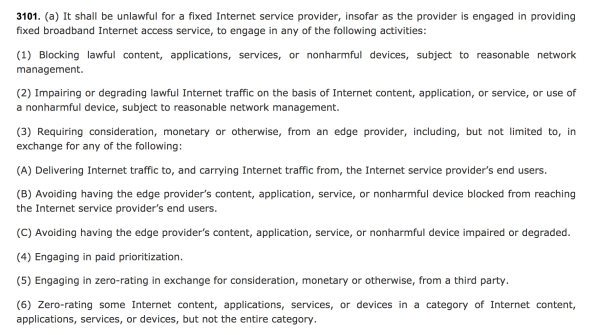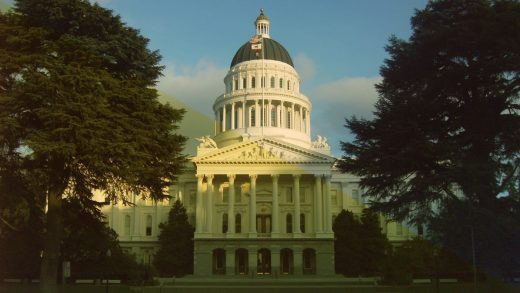How California’s super-strict net neutrality law reached the home stretch
It’s been a tough fight, with one near-fatal stumble, but California’s assembly just passed what are undoubtedly the strictest protections for net neutrality in the country–if not the world. After what supporters hope will be a perfunctory re-vote in the state Senate, the bill will go to Governor Jerry Brown, who has 30 days to sign or veto it.
SB822, originally drafted by San Francisco state senator Scott Wiener, was a direct response to the FCC’s repeal of its own Open Internet Order from the Obama years. Wiener sought to fold the provisions of that massive document into a manageable set of provisions that busy legislators–hardly telecom experts–could wrap their heads around. California was not the first state to pass a bill in the wake of the FCC repeal on December 14, 2017 (which officially took effect on June 11), but its comprehensive approach puts it far ahead.
Washington State led the effort with a bill, passed on February 28, that lays out the broad outlines of network neutrality: internet service providers may not block any legal content, slow down (a.k.a. throttle) the delivery of any legal content, or speed up content for providers that pay more. (States like Vermont and Oregon have followed with similar bills.) It’s a solid set of wholesome principles–and likely as complex a bill as could pass in Washington State’s meager two-month legislative season. But the devil is the details, which regulators will have to work out during implementation.

Two big headaches
California’s bill wraps in many of those complex details–especially the concepts called “zero rating” and “interconnection.” That made the debates much more confusing and contentious, and for a long time looked set to derail the process. A further complication: Senator Kevin de León of Los Angeles introduced his own (much weaker) net neutrality bill, setting up dueling legislation.
Zero-rating tends to happen with data-capped wireless plans: zero-rated content is exempt from those caps. The best-known program–and the one that gets it right, according to net neutrality advocates–is T-Mobile’s BingeOn, which allows any video provider that applies to utilize this unlimited bandwidth.
Wiener’s bill allowed all-may-participate plans like these, but prohibited ISPs from accepting money from providers for data-cap exempt services or from exempting just their own content from caps. (ISPs like AT&T and Verizon now own content providers like HBO and Yahoo, after all.)
Opponents of Wiener’s bill argued that any restrictions on zero-rating hurt poor people who can’t afford big data plans. Proponents argued that zero-rating is often used as an excuse to provide stingier data caps, and that it doesn’t really save users any money, but only restricts their choices.
Interconnection governs the arrangements between different parts of the internet. The net neutrality debate exploded in 2014 when it was revealed that several major ISPs were choking data flows from Netflix into their networks. The ISPs argued (and continue to argue) that big services like Netflix overwhelm their networks and thus should pay extra fees for access—which Netflix begrudgingly elected to do.
Net neutrality advocates argue that customers already pay the ISP for access to the content, and that collecting a fee from both them and content providers is double-dipping. In essence, it’s another kind of throttling–not at the little pipe entering the home (or phone) but at the big pipe entering the entire ISP. California state senate debates dragged on over these arguments, about whether customers or ISPs were getting ripped off.
Democrats’ come-to-Jesus moment
In the end, Wiener’s bill survived senate debate virtually unscathed, to pass by an overwhelming vote of 23 to 12 on May 30. On June 18, it was combined with de Leon’s bill in a unified package for the state Assembly to consider.
Then it crashed and momentarily caught fire, under intense lobbying pressure from telecom companies, lead by AT&T. Los Angeles assembly member Miguel Santiago, chair of the Communications and Conveyance committee, took a red pen to the senate bill, striking out nearly every provision of substance to leave a milquetoast list of platitudes. He also cut off debate, pushing the gutted bill through the committee–by unanimous, bipartisan vote–on June 28. Wiener withdrew support for his no-longer-recognizable bill, and all appeared to be lost.
None of this was due to partisan battle. California has an overwhelming majority of Democrats in the state house, as well as a Democratic governor. These were all battles among factions in the same party. That helps explain what happened next, when the full weight of the party (including from once and perhaps future Speaker of the House Nancy Pelosi) came down on Santiago. He also faced a heavy (sometimes nasty, ad-hominem) social media chastening from constituents.
About a week later, a humbled Santiago stood with Wiener and de Leon at a surreal press conference in which he voiced full-throated support for ultra-strict net neutrality regulation.
We’re now dealing with a straight-up misinformation campaign on our #NetNeutrality bill, #SB822: industry robo-calls to seniors falsely telling them that protecting net neutrality will increase their phone bills by $30. Scaring seniors w lies about their financial security? Gross pic.twitter.com/1Lgop6KwSl
— Scott Wiener (@Scott_Wiener) August 25, 2018
Industry opposition continued, including deceptive, alarmist robocalls. But after Santiago’s conversion, the path was largely cleared, culminating in an Assembly vote of 58-17 on August 30. Owing to some amendments, however, the revised bill will have to pass the State senate again before it goes to Governor Jerry Brown.
California’s likely success may embolden more states to pass their own net neutrality laws in the future. It may also embolden the federal government to strike back.
In repealing its own net neutrality regulations, the Republican-dominated FCC also asserted its right to preempt states from passing their own measures on the matter. However, state net neutrality proponents argue that, by giving up its authority to regulate the Internet, the FCC has also given up its power to preempt state laws. So, with the passage of California’s bill, the net neutrality fight migrates from the state house to the courthouse.
Fast Company , Read Full Story
(38)



